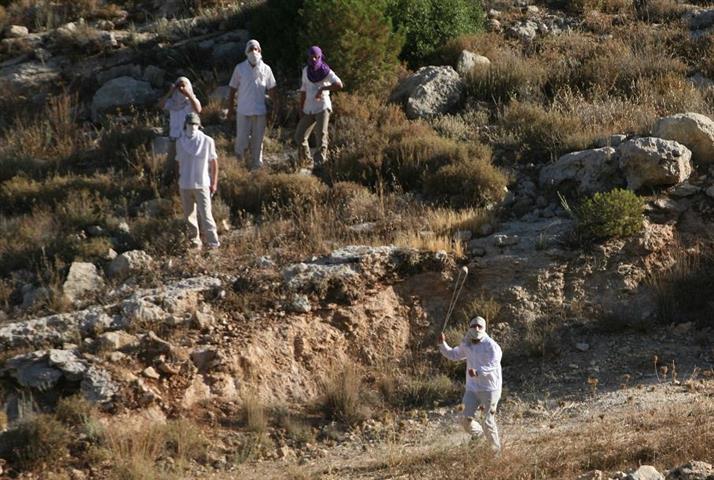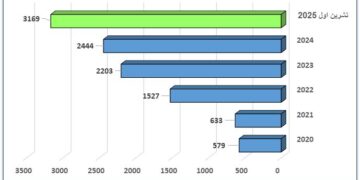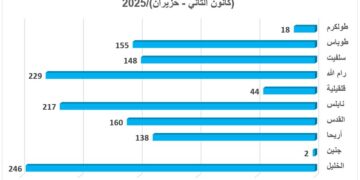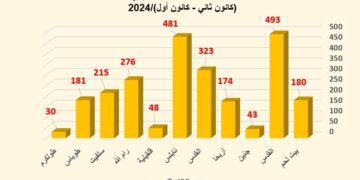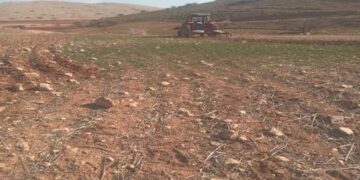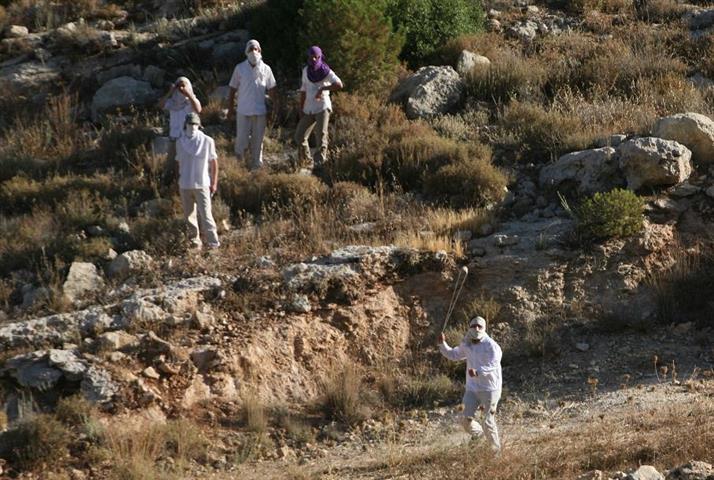Photo 1: a group of settlers from Beit Ayin attacking Khirbet Safa, Hebron
Settlers from Beit Ayin colony burned and uprooted hundreds of fruitful peach and grape trees in Khirbet Safa, Hebron district. The settlers attacks are part of daily behavior which has been going on since three months. These attacks include, among other things, storming houses, destroying property, opening fire and beating.
Photo 2: burned grape trees in Wadi Abu Rish, Khirbet Safa.
The Beit Ayin colony was established in 1992 by the former Israeli prime minister Ariel Sharon who was one of the masters of Israeli settlement in the occupied Palestinian territories. It was established over the land of Al Jab'a village in the north western extremity of Hebron district as one of the ten colonies forming the Gush Etzion settlement block which is one of the three major settlement blocks in the West Bank after Ariel in the north and Ma'ale Adumim in the centre. It is located at the distance of 1.5 km north of Khirbet Safa. The valley of Abu Rish ( Wadi Abu Rish) separates the colony from Safa hamlet. By the end of 2007 the colony had the population of 906 settlers (Source: Foundation for the Middle East Peace) from the most extreme right wing parties in Israel who accept no Arabs around. According to official Israeli figures the colony has about 1345 dunums as municipal area of which 239 dunums as built up area (Source: ibid). No fence, whatsoever, has been built around it so as to make it easier for settlers to attack and grab more Palestinian land.
Photo 3: Beit Ayin colony facing the Khirbet Safa agricultural land
Khirbet Safa
It is located about 20 km to the north west of Hebron city. It has a total population of about 1350 people and a land surface area of about 10 000 dunums of which 2000 dunums built up are ( Source: Palestinian Central Bureau of Statistics). The Khirbet's land is mostly cultivated with peach, grape and almond trees. The Khirbet is administratively linked to Beit Ummer town. it is surrounded from the east by Gush Etzion settlement block, from the west by Surif town, from south by Beit Ummer town and from north by Beit Ayin colony. It is worth mentioning that the mother town of Beit Ummer is also surrounded with colonies and bypass roads from three sides: Karmei Tzur colony from the south, Gush Etzion settlement block from north and bypass road number 60 from east. Beit Ummer's total population is about 15 000, and has the land area of 22000 dunums of which 3000 dunums built up area ( Source: ibid). About 6000 dunums of Beit Ummer's and Safa's fertile cultivated land will be either destroyed or included in the Segregation Wall once it is built between the two villages and Gush Etzion colonies. The Wall plan was introduced in this section three years ago but hasn't been implemented yet.
Photo 4: A general view of Khirbet Safa.
Map 1: location of Safa, Beit Ummer and Beit Ayin colony
A profile of settlers attacks against Khirbet Safa during June, 2009
18/6: Groups of settlers attacked Palestinian farmers whilst tending their land in Ein Al Bayada area north of the hamlet and opposite the colony forcing them to flee the area under gun point and stone throwing. The farmers were obliged to leave behind all the collected produce;
Photo 5: An Israeli settler using his sling against farmers from Khirbet Safa
19/6: A group of settlers set fire to fruitful almond and grape trees in the area of Al 'Iriq at the northern edge of the village destroying a big number of them. The burned trees are owned by the extended family of Thalji affecting dozens of people. The Hebron municipality's fire brigades rushed to the scene to extinguish the intentional fires. An empty gallon of Benzene and a match were found in the scene of the fire.
Photo 6 : Burned land in Khirbet Safa
Photos 7+8: A gallon and match found in the burned field
22/6: A group of settlers cut and uprooted dozens of fruitful olive, almond and grape trees in Wadi Abu Rish area north of the village causing heave losses. Quoting eyewitnesses and members from the Palestinian solidarity group as saying that the settlers carried out their attack under full army protection. Amongst the owners are the following:
1. Mr. Fahid Abdullah Wahadin;
2. Musa Abdulaah as Sulaibi;
3. Mr. Hammad Abdul Hamid Wahadin.
Photo 9+10+11: some grape and olive trees that have been cut by settlers from Beit Ayin
Victims' reports
In an Interview with LRC field researcher, one of the victims, Mr. Hammad Wahadin, 80 years old, said the following: 'I own along with my three brothers about 100 dunums of land in this valley since the fifties of last century. When I was plowing my land a week ago a group of masked settlers from Beit Ayin attacked me with metal bars injuring me on the head and abdomen. I was transferred by local people to Hebron hospital for treatment'.
Photo 12+13: Mr. Wahadin showing a long cut in his head caused by settlers
In another interview, Mr. Mohammed Jaber as Sulaibi, a land owner, said the following: ' The Israeli soldiers are the guardians of the settlers who perform the attacks. They even incite and encourage the settlers to attack. On one occasion last month the soldiers told the settlers that if a single settler was stoned by a Palestinian farmer they would retaliate by opening fire towards Palestinian farmers'.
Accumulated complaints
The Palestinian farmers who have been under various types of settler's attacks presented more than 20 complaints to Israeli police station in Gush Etzion, but, to no avail.
The lack of response on the part of the Israeli officials has encouraged the settlers to go on with their attacks and, consequently, discouraged Palestinian farmers from tending their land whose total area is estimated at 1000 dunums, 80% of which is cultivated land. 'It has become very dangerous to reach that land under the current circumstances', a Palestinian farmer told LRC field researcher. ' We dare to go reach that area only in the accompany of international solidarity groups who are our sole protectors', the farmer went on to say.
Relevance of above violations to international instruments
1) The Fourth Geneva Convention
-
Article 53: 'Any destruction by the Occupying Power of real or personal property belonging individually or collectively to private persons, or to the State, or to other public authorities, or to social or cooperative organizations, is prohibited, except where such destruction is rendered absolutely necessary by military operations.'
-
Article 47: 'Protected persons who are in occupied territory shall not be deprived, in any case or in any manner whatsoever, of the benefits of the present Convention by any change introduced as the result of the occupation of a territory, into the institutions or government of the said territory, nor by any agreement concluded between the authorities of the occupied territory and the Occupying power, nor by any annexation by the latter of the whole or part of the occupied territory.'
-
Article 147: 'Grave breaches to which the preceding Article relates shall be those involving any of the following acts … extensive destruction and appropriation of property, not justified by military necessity and carried out unlawfully and wantonly.'
2) Hague Regulations 1907
-
Section II Article 23: 'it is especially forbidden- to destroy or seize the enemy's property, unless such destruction or seizure be imperatively demanded by the necessities of war.'
-
Section III Article 46: 'Family honor and rights, the lives of persons, and private property, as well as religious convictions and practice must be respected. Private property cannot be confiscated.'
To Conclude:
The constant Israeli violations of the Palestinian right to land and land use must come to an end. Israel's military control of the Palestinian land must also stop and it must be made clear that the only illegal existence in the occupied Palestinian territory are the Israeli Army and the Israeli settlers and both of them must be evacuated if peace is ever to prevail on this land. The Palestinian suffered and yet continue to suffer for the last 62 years because of the Israeli occupation.
The international community is also no longer tolerant of the Israeli occupation not its violations of Palestinians' rights; also they are no longer able to put up with the Israeli settlers violation and the Israeli consecutive governments leniency with the settlers, or their clear disregard of international law and UN resolutions and human rights conventions; demolishing all hopes of the moderated and civilized nations longing for Peace in the Middle East.
Prepared by:


